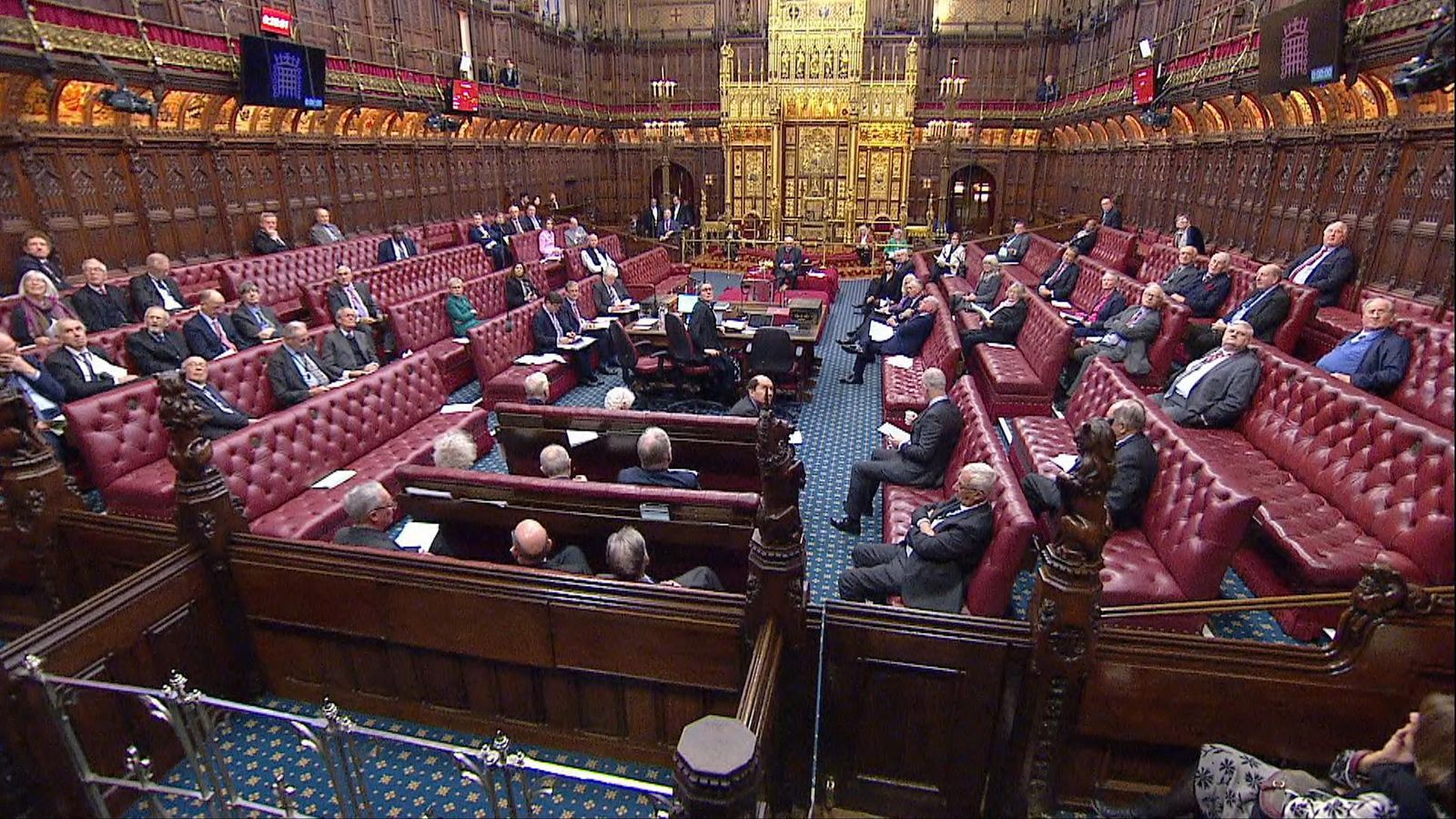The House of Lords could be replaced by bots with “higher productivity, deeper knowledge and lower running costs”, a peer warned as the debate continues over the risks of artificial intelligence (AI).
Lord Londesborough said AI will soon be advanced enough to deliver his speeches in his voice by analysing and processing the comments he has made on parliament’s live TV feed.
He asked the upper chamber if the prospect of being replaced by “peer bots” is either an “exciting” or an “alarming” one, before raising concerns about the impact AI could have on millions of workers in the UK.
Politics latest: UK cities need more people in them, says minister
The hereditary peer’s comments came during the latest debate in parliament on the development of advanced AI, associated risks and potential approaches to regulation within the UK and internationally.
Lord Londesborough, an independent crossbencher, said he was “briefly tempted to outsource my AI speech to a chatbot and to see if anybody noticed”.
“I did in fact test out two large language models. In seconds, both delivered 500-word speeches which were credible, if somewhat generic.”
Brian Cox and Simon Pegg among British stars rallying in support of Hollywood strike: ‘AI is taking our jobs’
Google testing if AI can write news – but insists it won’t replace journalists
AI: Facebook owner Meta announces its rival to ChatGPT will be free to use
He said AI “will soon be able to write my speeches in my personal style, having scraped Hansard, and deliver it in my voice through natural language understanding, having analysed and processed my speeches on parliament.tv”.
He said the technology will do this “with no hesitation, repetition or deviation”.
“Is it an exciting or alarming prospect that Your Lordships might one day be replaced by peer bots with deeper knowledge, higher productivity and lower running costs?” he asked.
Please use Chrome browser for a more accessible video player
As a few peers chuckled, Lord Londesborough insisted this is a prospect for “millions” of UK workers over the next decade, whose jobs could be replaced by AI.
But he also conceded that artificial intelligence could bring benefits, saying the UK economy is in “dire need of AI to address low productivity and growth and critical capacity”.
The rapid rise of artificial intelligence (AI) is not only raising concerns among politicians, but also some tech leaders at the heart of its development.
UK ‘must prepare for AI on same scale as pandemic’
While AI can perform life-saving tasks, such as algorithms analysing medical images like X-rays, scans and ultrasounds, there are concerns around its ability to do humans’ jobs, disinformation and so-called deepfakes.
The last few months have seen apocalyptic predictions, with leading developers warning that “generative” AI, capable of producing text and images from prompts and learning as it goes, poses a “societal-scale” risk similar to pandemics and nuclear war.
During the debate in the Lords, several reservations were raised in relation to bias and discrimination, privacy, security, journalism and the impact the technology could have on jobs and wealth distribution.
Please use Chrome browser for a more accessible video player
Crossbench peer Viscount Colville of Culross said he had asked ChatGPT to write him a speech on the threat AI poses to journalism and one of the paragraphs stated: “AI in its tireless efficiency threatens to overshadow human journalism.
“News articles can be automated and editorials composed without a single thought, a single beating heart behind the words.”
Read More:
‘Astoundingly realistic’ child abuse images being generated using AI
UN Security Council meets for first time about AI risks
Tony Blair: Impact of AI on par with Industrial Revolution
He said this was a “frighteningly good start” to his speech as he called for greater regulation.
This was echoed by former Labour deputy leader Lord Tom Watson, who said the UK’s preparedness for the impact of AI on jobs “has to be as urgent and at a scale as we currently deploy on pandemic management”.
Prime Minister Rishi Sunak is seeking a lead global role in driving forward international consensus on how to manage the AI risks with the opportunities, with the UK due to host the first major global summit on AI safety in the autumn.
Conservative peer Lord Fairfax said it “will be critical for that summit to do two things: one, to get the right people in the room, and in particular for the tech giants not to be allowed to regulate themselves”.
Responding, science minister Viscount Camrose said the government’s aim was to “unlock the extraordinary benefits of this landmark technology while protecting our society and keeping the public safe”.
“These advances bring great opportunities from improving diagnostics and healthcare to tackling climate change, but they also bring serious challenges such as the threat of fraud and disinformation created by deepfakes,” he said.
“We note the stark warnings from AI pioneers, however uncertain they may be about artificial general intelligence and AI biosecurity risks.”








